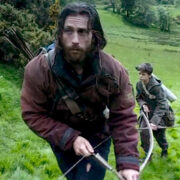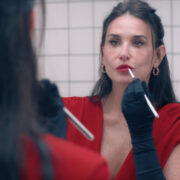Interview With T Cooper, Writer & Director Of MAN MADE
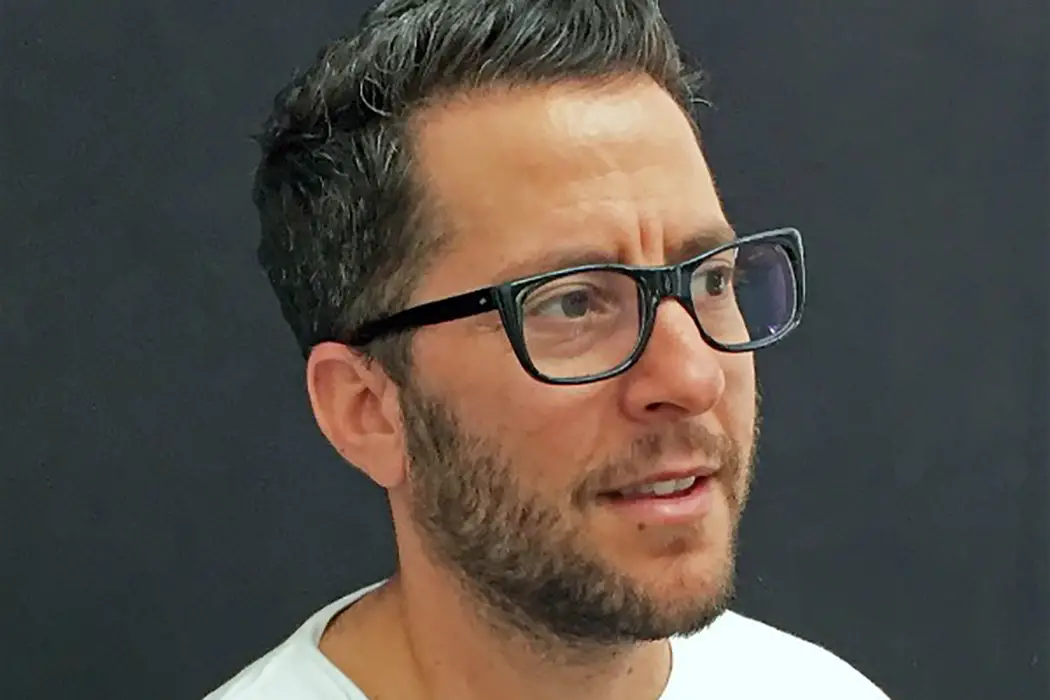
Alex Arabian is a freelance film journalist and filmmaker. His…
T Cooper is an accoladed and best-selling novelist, screenwriter, and journalist. Cooper has authored seven novels, including the best-sellers The Beaufort Diaries and Lipshitz Six, or Two Angry Blondes, as well as co-authored (along with Allison Glock-Cooper) the four-part young adult novel series, titled Changers. Book Four is slated to be released in September 2018, and Cooper is currently negotiating a TV deal with A&E.
His most recent nonfiction book is Real Man Adventures, which explores masculinity in today’s age, from the personal to the universal. Now, Cooper can add filmmaker to his tool belt. He recently completed his first feature length documentary, titled Man Made.
Man Made is a documentary that explores being one’s authentic self. It examines the lives of four transgender men as they prepare for the world’s only all trans men bodybuilding competition, Trans Fit Con, held in Atlanta, Georgia. The documentary’s look at authentic relationships and glimpses into the everyday lives of trans men make Man Made a compelling and emotional watch; Cooper digs deep where most filmmakers haven’t before him, a perspective which he attributes to his own experience as a trans man.
I had an opportunity to speak with Cooper ahead of Man Made‘s screenings at the 42nd San Francisco Frameline Film Festival, which celebrates LGBTQ film. We discussed his approach to shedding light on his subjects, his style of filmmaking, his artistic inspirations, his take on the progress of trans lives in the age of the rise of conservative values, Téa Leoni‘s participation in helping getting the film made, and what projects he’s currently working on.
For those interested in seeing this fascinating documentary, Man Made is screening at Frameline42 this month and Outfest in Los Angeles in July.
Alex Arabian for Film Inquiry: Hi T, congratulations on your first feature, Man Made!
T Cooper: Thank you [laughs]. It is quite a journey, as they say.
I cried several times throughout your documentary.
T Cooper: I love to hear that.
How did you delve into the subject matter, the lives of these trans men so thoroughly and authentically with such grace?
T Cooper: Wow. Well, that is really great to hear that it landed like that with you. For me, I think the foundation behind answering that question is really just the place I was coming from personally as a trans man also, by no means the same experience, but definitely a similar experience. And I think with those moments that hit you, and they still hit me after hundreds and hundreds of times of seeing it and editing, I think those really just came from an organic place where these guys trusted me, and I trusted them, and there was just this real kind of mutual understanding between us and a trust that I was gonna take care of their stories in a way that I would take care of my own because, in a way, it is my story, even though I’m not a bodybuilder.
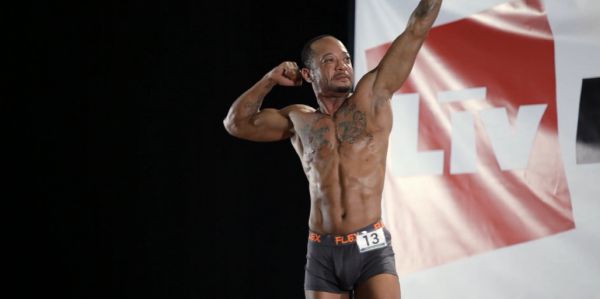
I feel like those moments were just so authentic and real and, as you saw in the film, there were times when it felt right and organic to kind of let myself experiencing those things, too, creep in. Now, not too many times because, of course, it wasn’t about me, but a non-trans male director would not be asked to help pull down a binder or help load the testosterone or even in be in a surgery suite for six hours or in a room full of big, swinging dicks [laughs] in your standing area, you know, with Mason.
Did you always envision the project being a sort of cinema verité-esque style?
T Cooper: Yes, definitely. Definitely. I mean, that’s always appealed to me as a creative person and always someone who just loved documentaries my whole life. I mean, that’s the first time I got my eyes on that style. And in fact, I think one of the early docs I saw, because I grew up in Southern, California, was Pumping Iron, and obviously that style has developed a lot since then, but the informality of just kind of peeking in on these guys’ lives was always super interesting to me and also, obviously, the construction of masculinity and maleness and the so-called pinnacle of maleness was always something that was interesting to me.
So, kind of blending those two for this, meaning that last answer. I wanted it to feel organic and lived in and real, and I wanted it to feel like it was literally unfolding in front of your eyes, because it was unfolding in front of my eyes. That was something that definitely went on the docket. And I wouldn’t say that – it’s a first feature [laughs], so there are certain things I learned along the way, as far as how to capture those moments and how to really try to not only prioritize emotion but also make the vantage point of interest. I think I learned that as we were shooting. And I shot about – I’d say about 85% of it myself, and then the rest is what we would kind of have some crew with me, have enough budget to get some other ears and eyes on it.
You’re an acclaimed writer, novelist, and journalist, and filmmaker. What are some of your artistic and cinematic influences?
T Cooper: Oh, wow. That’s a good question. I love the classics. I was kind of raised on the classics, great books of literature from the Brontes to Tolstoy [laughs] to Moby Dick; I guess I learned my storytelling from that. But that was more, obviously, as a writer in the two-dimensional space on the page. He just died, but Philip Roth, with all of his [laughs] troubles that come with him, has been a strong influence on me as far as contemporary fiction writing goes. So, I don’t know. I don’t know, man. I just love stories. I love human stories, all kinds, whether they’re, quote, “real,” and nonfiction, or, quote, “fake,” which is fiction, but to me, some of the best fictional stories feel real as in writing and move you in similar ways and move you in ways that, quote, “real” stories can’t.

So, as far as storytelling goes, I’m all over the gamut of genre because if stories move, then I want to tell them, and I want to read them, and I want to be part of them. So, I’ve always been a big reader of English literature and all that, especially contemporary American literature. But I’ve even been inspired by recent TV, TV storytelling, and how that’s adapted over the past however many years it’s been now since, what, The Sopranos, and that’s when I really started thinking, “Hey, I want to start to take my storytelling off the page and onto the screen,” and I was lucky to get to write for a couple TV shows and [I’m] writing for some now.
And then when I found out about this, you know, bodybuilding competition, it was just a natural fit. I just knew somehow I wanted to tell this story in a three-dimensional way. And at first, my impulse was to write about it, like journalism and maybe bring a camera along and get some kind of cool stills, but once I met these guys and starting spending time in their lives and realizing how full and rich they were, just like my life, they were just so much more than just this label of transgender or female-to-male transgender or whatever, or even bodybuilders. There’s just so much more going on in their lives, like there’s so much more going on in my life, and I wanted to somehow show that and, I think, kind of picking four guys all headed toward this one thing was a really great structure to show them.
The march in the end reminded me of the hateful times that we are living in, but it also exhibited how much love and acceptance is out there. Do you see progress in terms of social justice for trans lives in the age of Trump and the rise of white supremacy and traditional values?
T Cooper: I mean, I do and I don’t. I love the conversations that are happening, because they’re happening and they weren’t before. I’ve been transitioned for many, many years, and I have a lot of friends who have been transitioned for many years, before people even knew that trans men existed, for the most part [laughs]. So, I love that for me it was this, like, secret how do you get information kind of thing, but for kids now, for guys now, you can go on the Internet and see thousands of guys who’ve gone through things that you wanted to go through or that you’re thinking about going through, whether it’s surgery or hormones or talking to parents or dealing with school or whatever. And now, you’re able to see these same guys and then they’re able to even see films or TV and have models. And I love that.
I’m afraid that – well, exactly what you just described. In this new era, I’m afraid that actually, with that visibility, the back door has opened up, and now some kind of much more hateful legislation is in place that people didn’t even have the language before. No one even knew there were trans people in bathrooms [laughs] until the visibility came to us. So, learning more is also unfortunately right now allowing the knowledge to legislate against that now. And it’s really terrifying to me that rights that had been granted are now under attack. It’s just so backwards, and I know people who see stories like this and so many others and can be moved. But you’ve got to give the people that tell these stories power in the first place to tell them. And you know, in larger scales, people get moved.
The four subjects all have such diverse and touching stories. Out of the 12 competitors participating at Trans Fit Con, what stood out to you and what made you pick Rese, Mason, Kennie, and Dominic?
T Cooper: It was a real natural progression, I’d say, because when I decided, “ok, I wanted to make a film about this,” I got some seed money, exploratory money from my producing partner. And we got a couple cameras together, an audio guy, and we said, “Let’s shoot the first Fit Con.” We shot the very first one. For instance – just for reference, it’s where Dom was pre-surgery, and he came in third place. So, when I shot that, I met all those guys. And there were some who had not known until they literally showed up, I found out that they were going to show up at the second Fit Con that we filmed. So in some cases, it was because I had not even known about them, but when I met Kennie and I met Rese, and Dom, and Shawn, too, the one who won who ended up being a judge. I don’t know. I was like, “Let’s get a camera. Let’s see what’s going on in their lives.”
And so, the more time I spent with them, the more I realized what was going on. And it was really important to me to show a diversity of trans lives, trans bodies, and trans experiences, because there’s no one way to transition. There’s no one transgender person, and I just don’t think there’s a ton known about trans men, and so I just wanted to [be] very, very, I guess, intentional about the guys that were chose because someone like Mason, who I found out about only when I knew he was registering for the second competition – well, he competes in non-trans bodybuilding, so he just looks like a bodybuilder.
So, I just wanted to make sure that a guy like that, since this is his passion and this is something that may have saved his life, I want him and his life. Middle of America, Ohio, white guy. But it was really important to explore diversity with race, with socioeconomics, and age, and geography. A guy like Kennie, his experience is so different from a guy like Tommy, for instance, in Miami because Kennie‘s life and existence is in danger just by being who he is, walking down the street, or jogging down the road. I think, for me, it was really about showing varied lives. I think also, a character who experiences homelessness and has to contend with the fact that to be himself, he’s not allowed in his home, and is willing to live on the streets in order to be himself – and then also what does that decision entail for his life? It means shelters don’t even want you there. You know? They don’t do it.
And then also somebody who has a kid. So it was really about a diversity of experience and making sure that you feel like you’re getting, a pretty well-rounded view of the trans male experience in these guys who happen to share one thing, which is that they’re all headed to this competition and they all are into bodybuilding.
Do you still keep in touch with Rese, Mason, Kennie, and Dominic?
T Cooper: Yeah, 100%. I would say with the film festival circuit, there’s some guys coming. Like, Dom will be at Frameline. We’re gonna do a screening at ESPN next week, actually, with Mason. And so, we’ve had someone I would say at almost every screening. Rese came, Kennie [did too]. I’m keeping up with them there. And I definitely would consider some of them friends for sure and friends for life, because I just feel so honored that they opened up their lives to me like that and trusted me to tell them in an honest way, warts and all. I feel like we shared something, and I’m definitely friendly with them and some of their spouses and I know I will stay in their lives. I really do care what’s going to happen to them. You know, it’s not essential to the film.
If you could give advice to somebody going through a gender transition, or any difficult transition, for that matter, considering coming out, or struggling with their identity, what would you say, based on your personal experience?
T Cooper: Like I had said before, there’s no one way to transition. And there’s no one way to really experience any major life transition, and going back to kind of what I was just saying about the diversity of trans experiences, the things that these guys go through – like, for instance, you take DJ’s and Kennie’s relationship, right, that’s symbolic of everything that we go through in relationships. When you sign on for someone, you don’t know what’s gonna happen. You don’t know if someone’s gonna decide they want to have kids or not decide they want to have kids. Or maybe they want to move to another country or – you know what I’m saying? It’s like that’s all very universal stuff..
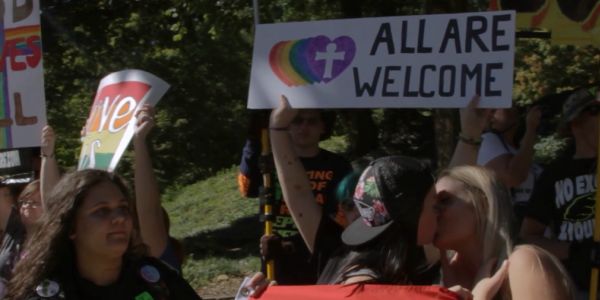
And so, huge changes, huge transitions like that, work, body stuff, sexuality, gender, like you’re saying, I think finding a community of folks who can provide some reflection is really important because if you can’t see yourself when you look in the mirror, you can’t see yourself when you speak of your experience, when you speak your experience, I think it’s really hard because it-it’s easy to feel erased and invisible. So, I just think reaching out to safe people is really important. And like I was saying before, you’re talking about the transition; transitioning. There’s so many more resources available, which I’m so happy for, and I think so many people are very fortunate to have access to – health care and information and safe treatment. But so many other people don’t. They don’t have the means or they don’t have the geographical access.
So, even one ally can help. And I think that seeing stories like Man Made and so many other films that are out there now, not only this year but just in general, I think that’s so important. So many of the guys – actually, I’ll shut up, but it’s interesting. I didn’t put it in the film because it felt a little bit too self-reflective – but there were so many people who said, “When I saw a film [laughs] about a dude and there was a before picture and an after picture, it was like my life exploded and I realized, like, oh my god, that’s me.” Like, I would say four of those guys said they saw themselves – or saw something out there and were like, I can do that, too.
For me, if one person can look at Man Made and go, “Holy shit, I can do that too,” I will feel so psyched [laughs], because to me, these guys inspire me. Like, again, I’m not a bodybuilder, but the visibility and what it takes to step on stage like that, like they do is just – it’s so admirable. They inspire me in everything I do, not just this kind of stuff. But I think you can apply that to everything, just the boldness that it takes to be honest and to be confident to step onstage wherever you’re at. It might not be perfect for you, but you’re perfect. You know? And I love that that place says, “Hey, wherever you’re at, you’re welcome here.” You know? You can have what people look at as breasts. You can have had surgery. You can have had hormones. You can have no hormones. You know, whatever it is, this place celebrates you and your hard work, wherever that work’s taking you.
You were able to make this film with the generous support of Sundance. One thing that stood out to me was Téa Leoni’s participation in the film. At what point during production did she become involved, and did she have any creative say, or did she stand back and let you do your thing?
T Cooper: I think it was definitely more of the latter. However, she was, from the very beginning, a cheerleader, because – I’m sure you know, obviously you write about films and you’re involved – it’s a massive endeavor, and it’s daunting, and so many times during the process you think, “What the hell am I doing [laughs]? Who do I think I am? This will never get finished.” And I think when I got to go to the Sundance Creative Producing Summit and meet other filmmakers who have been through that exact process, I was like, “Oh, okay. I’m not crazy.” Like, oh, you wanted to quit 50 times before, and you wanted to quit 20 times before, and you ran out of money, too. You know what I’m saying?
So, it was really nice to have her experience and guidance and support, financial and otherwise, to just keep pushing and being, like, “This is gonna get done.” We’ve been friends for years, personally, and so on this kind of creative level, too. She gives a shit about these stories, and she wants to make sure they get told. She didn’t want these to end up on a hard drive somewhere. She wanted the world to see these stories because she’s very passionate about social justice and equal rights and especially trans rights because she’s known me for – I don’t even know. It’s 10, 12 years now or something. 15 years. So, she’s seen my experience in the world as a trans person, too. I was just really grateful for her steady hand and belief in me and belief in these stories, and creative ways of getting it out there and making connections; it’s hard, man. Just making the film’s hard, but then you finish it, and you’re like, “Oh, shit. There’s a whole other marathon that needs to be run.”
Right. No kidding [laughs].
T Cooper: She was a good coach for that marathon.
I, like many, am an aspiring screenwriter. Your success is an inspiration to me. Was your career route more traditional a la the film school education road, or were you more self-taught?
T Cooper: Yeah, with film and TV, it’s all self-taught. I threw a camera on my shoulder and went and spent time with Rese when he was homeless on the streets. And I just figured out – I borrowed the equipment from the production company. I did audio. I just figured that shit out on my own. And as far as screenwriting goes, too, as a writer – I mean, I guess you could say I was a trained writer in the sense that I got an MFA in fiction writing and wrote novels, short fiction, non-fiction. But as far as taking that to the screen for TV writing, yeah, it’s also all self-taught. It was actually an original project that my wife and I co-write for TV, and Téa, my wife, and I were sitting around one day and Téa – we said, “Hey, we have this idea for a TV show,” and she’s like, “Let’s go pitch it.” So that was years ago, and we sold the show to Showtime, actually, and through that process is where I really learned TV writing because I got to engage with the network and do revisions and work on the pilot. And sadly, they didn’t make it. But it was super educational, and so I got to apply that stuff to the next TV writing project.
I worked for a show called Copper, which was on BBC America, and then wrote for The Get Down, which is on Netflix. And yeah, I just learn something every time. I mean, I just feel like stories are – these stories, if you believe in them and you’re passionate about them and you’re gonna get them done and told no matter what, the form will take care of itself. You know? It will speak to you as far as what the form of the story needs to be. Like, with this film, I was certain it was gonna be a piece of journalism. I pitched editors at Mother Jones that I’d worked with and New York Times Magazine, and they were psyched. They were like, “Oh, this sounds great. Do that. Go to the thing. Report on it.”
But then, like I said, the minute I started spending time with these guys and talking to them, the form actually spoke to me, and I said, “Oh, no. I need to listen to that, and this needs to be on film.” And then, at that point, I was doing everything I could to teach myself and find resources and fundraise to get all the tools together so I could tell it in that form.
Are there any exciting projects that you are currently working on?
T Cooper: Yeah. So, I said my wife and I are co-writers for television, so we also wrote a young adult book series. It’s a four-part series called Changers. And the fourth book in the series is coming out in September, but we have been engaged with A&E Studios because we’re writing a pilot for them and trying to adapt that for screen. So you never know if it will get made, ultimately, but that is what we are doing now and really hoping to bring that book series to the screen.
Wow. That’s awesome. I look forward to seeing that.
T Cooper: Yeah. Me, too [laughs].
Film Inquiry would like to thank T Cooper for taking the time to speak with us.
Man Made will screen at Frameline42 in San Francisco on Saturday, June 16th, at 1:15pm at the Roxie Theatre and Thursday, June 21, at 7:00pm at Rialto Cinemas Elmwood. It will also screen at Outfest in Los Angeles on Saturday, July 21, at 12:00pm at the DGA2.
Does content like this matter to you?
Become a Member and support film journalism. Unlock access to all of Film Inquiry`s great articles. Join a community of like-minded readers who are passionate about cinema - get access to our private members Network, give back to independent filmmakers, and more.
Alex Arabian is a freelance film journalist and filmmaker. His work has been featured in the San Francisco Examiner, The Playlist, Awards Circuit, and Pop Matters. His favorite film is Edward Scissorhands. Check out more of his work on makingacinephile.com!









